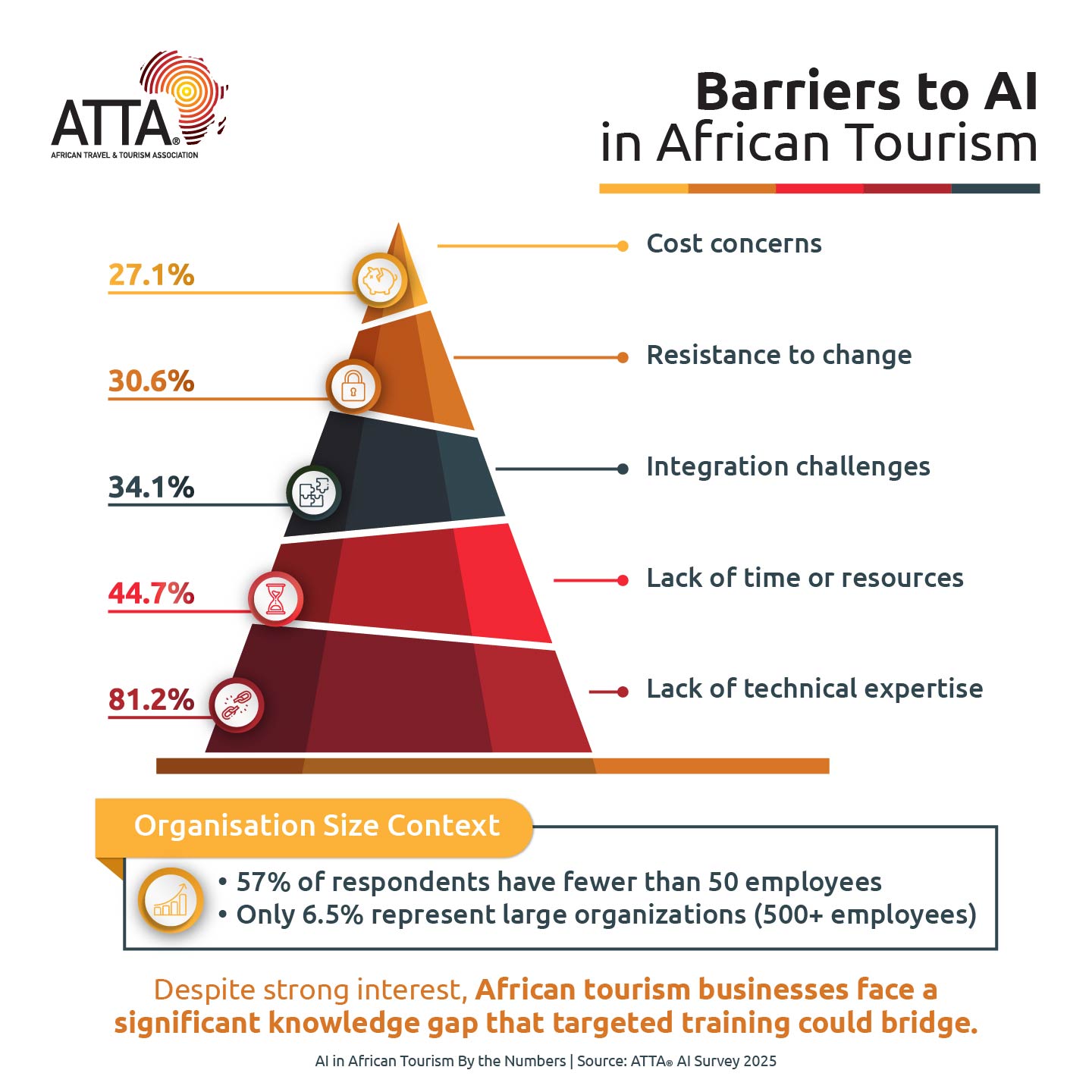Bridging The Knowledge Gap: Overcoming African Tourism's Biggest Ai Challenge

While African tourism businesses show remarkable enthusiasm for AI adoption, a significant hurdle stands in their way: 81.2% of our survey respondents cited lack of technical expertise as their primary barrier to AI implementation.
This knowledge gap isn't unique to Africa—it's a global challenge. In a region where tourism is dominated by small businesses with limited resources, bridging this gap requires focused, practical approaches that don't rely solely on formal education systems or expensive consultants.
The good news? ATTA®'s research reveals that despite this challenge, tourism professionals are committed to overcoming it, with 71.8% planning to invest in AI tools or training within the next 12 months. This determination, coupled with a preference for practical, hands-on learning, creates a foundation for addressing the knowledge gap strategically.
Understanding the knowledge gap
Before exploring solutions, it's important to understand what the AI knowledge gap really encompasses. Our survey findings indicate two distinct dimensions:
Technical knowledge
The first dimension involves practical skills: knowing how to use AI tools, understanding prompts, configuring chatbots, or interpreting AI outputs. This is the "how to" knowledge that enables day-to-day implementation.
Strategic understanding
The second dimension involves broader business intelligence: recognising where AI can add value, identifying appropriate use cases, understanding limitations, and integrating AI into business strategy. This is the "why and where" knowledge that guides effective implementation.
Both dimensions matter. A tourism business might have technical skills to operate an AI chatbot but lack the strategic vision to identify the most valuable applications. Conversely, a business with clear strategic goals might struggle with the technical execution.
Learning preferences in African Tourism
Our survey revealed clear preferences for how tourism professionals want to acquire AI knowledge:
- 81.2% prefer live webinars with Q&A sessions
- 68.2% value recorded tutorial videos
- Live demonstrations and hands-on examples rated highly important (84/100)
These preferences point to a desire for interactive, practical learning rather than theoretical education. Tourism professionals want to see AI tools in action, ask questions, and apply knowledge immediately to real-world scenarios.
Moreover, 91.8% of respondents are interested in applications specific to travel and tourism rather than generic AI knowledge. This highlights the importance of contextualizing AI education within industry-specific use cases and scenarios.
Given the industry's learning preferences and the predominance of small businesses, a self-driven approach to building AI knowledge is both practical and necessary.
Here's a framework for tourism businesses to systematically address their knowledge gaps:
1. Start with high-impact, low-complexity applications
The survey reveals that 86.7% of businesses using AI apply it to marketing and content creation—and for good reason. This area offers the lowest barrier to entry with the highest immediate impact.
Tourism businesses should identify similarly accessible entry points:
- Content creation and translation
- Simple chatbots for frequently asked questions
- Social media content generation
- Basic data analysis of customer reviews
These applications provide immediate value while building foundational knowledge that can be applied to more complex projects.
2. Embrace learning by doing
Rather than waiting for formal training programmes, tourism businesses should adopt an experiential learning approach. Our survey showed that 81.2% prefer interactive learning formats, highlighting the importance of hands-on experience.
This means:
- Starting small with pilot projects that involve minimal risk
- Designating AI champions within the organisation who can experiment and share knowledge
- Documenting learnings and best practices as they emerge
- Gradually expanding usage as confidence builds
3. Leverage available resources strategically
While formal education has its place, tourism businesses can tap into numerous existing resources to build knowledge:
- AI tools themselves as learning platforms (e.g., using ChatGPT to understand AI capabilities)
- Podcasts and following experts on platforms like LinkedIn
- Free or low-cost online courses focused on practical applications
- Peer learning through industry associations like ATTA®
Beyond tactical approaches, bridging the knowledge gap requires cultivating a learning culture within tourism businesses. Our research indicates that successful AI adopters share several cultural characteristics:
- Curiosity and experimentation: Leaders who encourage teams to explore, test, and even occasionally fail with new AI applications create environments where knowledge grows organically. Small experiments build collective expertise over time.
- Cross-functional collaboration: AI knowledge shouldn't be siloed within IT or marketing departments. When diverse team members—from operations to customer service to finance—engage with AI tools, the organisation develops a more comprehensive understanding of applications and possibilities.
- Continuous learning habits: Given AI's rapid evolution, the most successful organisations establish regular learning rhythms—weekly AI exploration sessions, monthly knowledge-sharing meetings, or dedicated time for experimenting with new features.
- Leadership commitment: When top management demonstrates commitment to learning and using AI, it signals importance and creates permission for teams to invest time in building knowledge. Our survey showed that 46.2% of respondents were Owners/CEOs/Directors, indicating strong leadership interest in AI adoption.
The AI knowledge gap presents a real challenge for African tourism businesses—but not an insurmountable one. By embracing practical, self-driven approaches to learning, the industry can transform this challenge into an opportunity for innovation and differentiation.
You don't need to understand every technical aspect of AI to benefit from it. You just need enough knowledge to apply it effectively to your specific challenges and opportunities.
The businesses that will thrive are those that view AI knowledge not as a binary state—either you have it or you don't—but as a continuous journey of exploration and application.
By starting small, learning by doing, collaborating with peers, and cultivating a learning culture, African tourism businesses can bridge the knowledge gap and position themselves at the forefront of AI-enabled tourism.
The path forward is clear: start where you are, use what you have, and learn as you go. The knowledge gap is not a barrier—it's simply the first step in the journey toward AI-empowered African tourism.
If you found this interesting, click here for more ATTA® resources on Generative AI in Travel. Note this if for members only.
